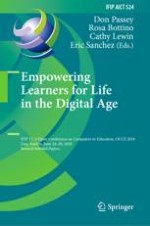This book constitutes the refereed post-conference proceedings of the IFIP TC 3 Open Conference on Computers in Education, OCCE 2018, held in Linz, Austria, in June 2018.
The 24 revised full papers and 3 short papers included in this volume were carefully reviewed and selected from 63 submissions during two rounds of reviewing. The papers discuss key emerging topics and evolving practices in the area of educational computing research. They are organized in the following topical sections: computational thinking; programming and computer science education; teachers’ education and professional development; games-based learning and gamification; learning in specific and disciplinary contexts; learning in social networking environments; and self-assessment, e-assessment and e-examinations.
